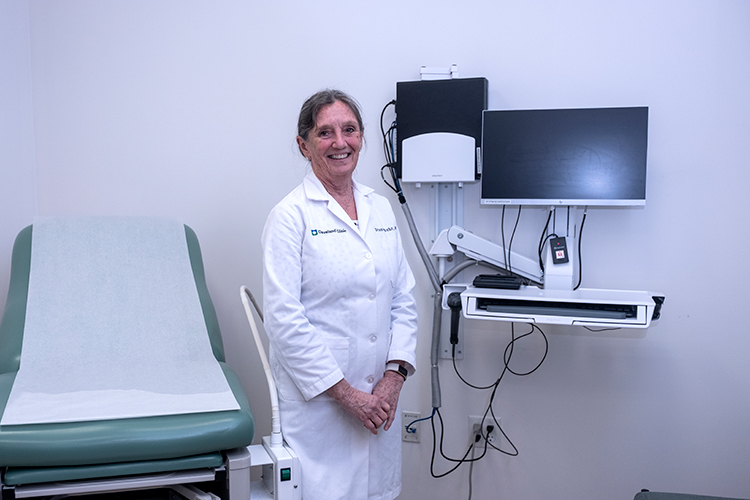
Because of the complexities of the female anatomy, women generally start seeing a gynecologist for yearly pelvic exams and periodic Pap smears in their teens and continue through menopause and into their golden years, but it is not something most women look forward to. So, when a woman reaches the age of 65 and her gynecologist tells her that she no longer needs to get a Pap smear, she breathes a sigh of relief.
The problem is that many women view this reprieve as a reason to stop visiting the gynecologist altogether.
“Pap smears are generally done three years apart, and as long as the previous three tests come back clear of any abnormalities, then [a woman] should be safe to discontinue the testing at age 66,” said Dr. Diane Ruhr, a gynecologist with Cleveland Clinic Indian River Hospital Partners in Women’s Health.
“But that doesn’t mean you should stop getting a routine pelvic exam at least every two years,” Dr. Ruhr continued. “During a pelvic exam we consider all parts of the female reproductive tract. The top five cancers for women are: uterine, ovarian, cervical, vaginal and vulvar cancer. There is no screening for uterine cancer and with vaginal and vulvar cancer it can start with something as innocuous as a small little mole or lesion which you can’t feel but can be seen with a pelvic exam.
All are very treatable forms of cancer, but the key is to catch them early on.”
Dr. Ruhr encourages women over 65 get a routine pelvic exam every two years even if they’ve had a hysterectomy for benign reasons like bleeding or fibroids. “After that hysterectomy you never need a pap smear again even if you’re only 35,” she said. “But you still have a vulva and vagina and sometimes the ovaries are left in place. During the exam we can check the uterus and ovaries to make sure they are not enlarged or irregular.
“Women with a history of cervical cancer need to be followed closely for 25 years regardless of how old they are,” Dr. Ruhr added. “If a women had cervical cancer when she was 50 then she will continue regular exams and pap smears until she is 75.”
The American Congress of Obstetricians and Gynecologists (ACOG) also stresses the important of the routine assessment for older women, stating that while a woman may not need an annual Pap smear, she still needs an exam to check the vagina, the bladder, the rectum, the external genitals and, of course, the uterus and ovaries, if they haven’t been removed. The exam can also address common symptoms of aging like bladder and bowel issues and sexual dysfunction.
While cancer is the greatest fear for many women, pelvic organ prolapse actually is one of the most common gynecological issues for those over 60. Prolapse means the uterus, bladder or rectum descends through a woman’s vagina and needs to be surgically repaired. This occurs because muscles and soft tissues were damaged during childbirth and they weaken with age.
Bladder leakage and frequent urination are other common problems in women over 65 that can also be addressed during a pelvic exam. There are numerous treatments and medications to help women stay active and in good health no matter what their age.
During your routine gynecological exam, the doctor will also look at your breast and nipples for leakage, lesions, redness, dimpling or other signs that there could be a problem and feel your breast and under arms for lumps or masses. This is in addition to the recommended mammogram screenings.
“The bottom line is that women need gynecological care at every stage of their life, whether they need a Pap smear or not,” Dr. Ruhr concluded. “If you are told that you no longer need a Pap smear, don’t ignore the rest of your anatomy. It’s not all about the cervix.”
Because of the importance of pelvic exams after age 65, it seems like Medicare would cover them, but that’s not always the case. Check with your provider beforehand to see what is and isn’t covered so you don’t get a surprise bill.
Dr. Diane Ruhr completed her medical education at the University of Minnesota Medical School and her residency at the University of Minnesota Health Care System. She is accepting new patients at Cleveland Clinic Indian River Hospital Partners in Women’s Health, 1050 37th Place, Suite 103, Vero Beach. Call 772-770-6116 to schedule an appointment.



